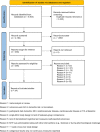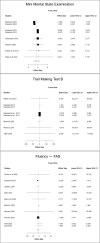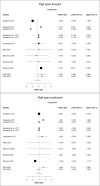Systematic review and meta-analysis of the effects of menopause hormone therapy on cognition
- PMID: 38501109
- PMCID: PMC10944893
- DOI: 10.3389/fendo.2024.1350318
Systematic review and meta-analysis of the effects of menopause hormone therapy on cognition
Abstract
Introduction: Despite evidence from preclinical studies suggesting estrogen's neuroprotective effects, the use of menopausal hormone therapy (MHT) to support cognitive function remains controversial.
Methods: We used random-effect meta-analysis and multi-level meta-regression to derive pooled standardized mean difference (SMD) and 95% confidence intervals (C.I.) from 34 randomized controlled trials, including 14,914 treated and 12,679 placebo participants.
Results: Associations between MHT and cognitive function in some domains and tests of interest varied by formulation and treatment timing. While MHT had no overall effects on cognitive domain scores, treatment for surgical menopause, mostly estrogen-only therapy, improved global cognition (SMD=1.575, 95% CI 0.228, 2.921; P=0.043) compared to placebo. When initiated specifically in midlife or close to menopause onset, estrogen therapy was associated with improved verbal memory (SMD=0.394, 95% CI 0.014, 0.774; P=0.046), while late-life initiation had no effects. Overall, estrogen-progestogen therapy for spontaneous menopause was associated with a decline in Mini Mental State Exam (MMSE) scores as compared to placebo, with most studies administering treatment in a late-life population (SMD=-1.853, 95% CI -2.974, -0.733; P = 0.030). In analysis of timing of initiation, estrogen-progestogen therapy had no significant effects in midlife but was associated with improved verbal memory in late-life (P = 0.049). Duration of treatment >1 year was associated with worsening in visual memory as compared to shorter duration. Analysis of individual cognitive tests yielded more variable results of positive and negative effects associated with MHT.
Discussion: These findings suggest time-dependent effects of MHT on certain aspects of cognition, with variations based on formulation and timing of initiation, underscoring the need for further research with larger samples and more homogeneous study designs.
Keywords: Alzheimer disease; HRT (hormone replacement therapy); cognition; menopause; meta-analysis.
Copyright © 2024 Andy, Nerattini, Jett, Carlton, Zarate, Boneu, Fauci, Ajila, Battista, Pahlajani, Christos, Fink, Williams, Brinton and Mosconi.
Conflict of interest statement
The authors declare that the research was conducted in the absence of any commercial or financial relationships that could be construed as a potential conflict of interest.
Figures





References
-
- Farrer LA, Cupples LA, Haines JL, Hyman B, Kukull WA, Mayeux R, et al. . Effects of age, sex, and ethnicity on the association between apolipoprotein E genotype and Alzheimer disease. A meta-analysis. APOE and Alzheimer Disease Meta Analysis Consortium. Jama. (1997) 278:1349–56. doi: 10.1001/jama.278.16.1349 - DOI - PubMed
Publication types
MeSH terms
Substances
Grants and funding
LinkOut - more resources
Full Text Sources
Medical

